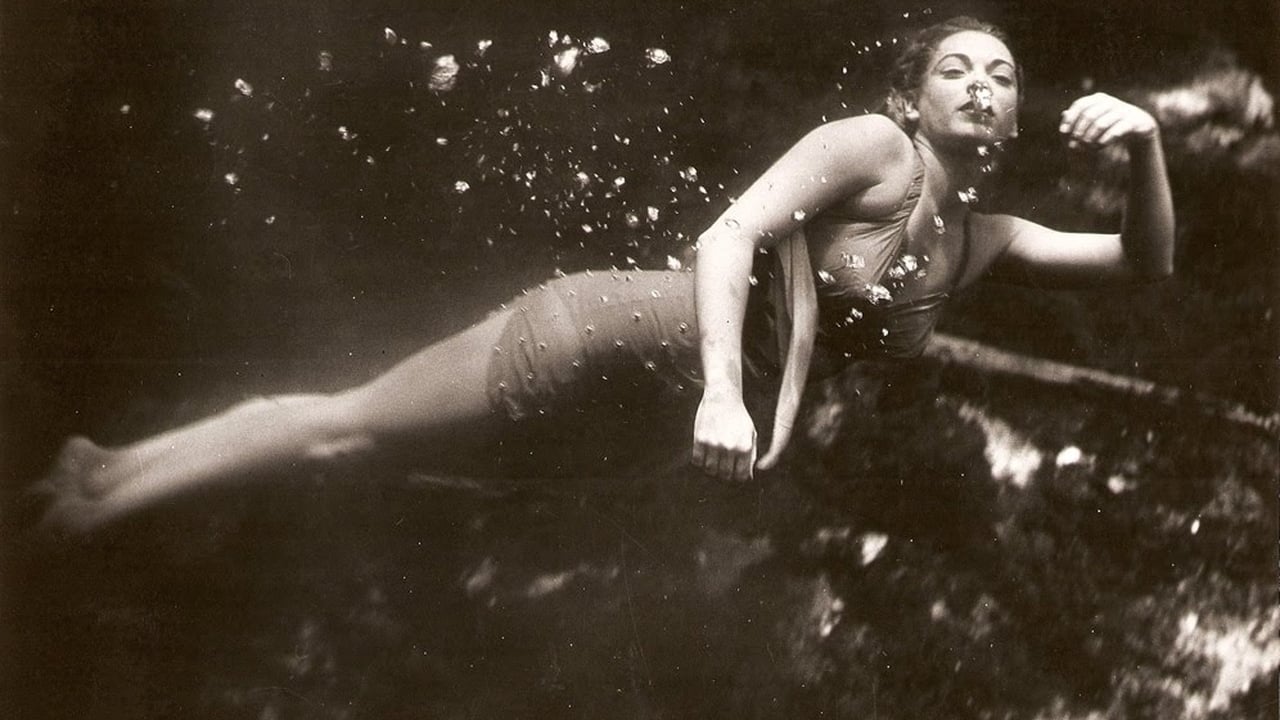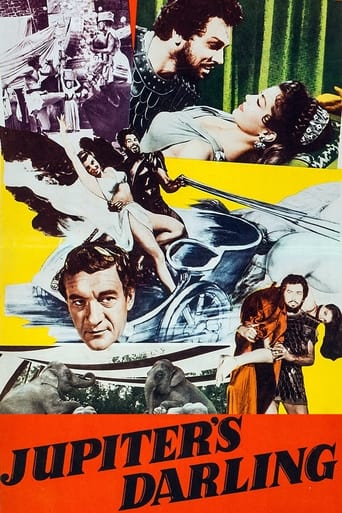

A Disappointing Continuation
... View MoreThe film's masterful storytelling did its job. The message was clear. No need to overdo.
... View MoreIt's a good bad... and worth a popcorn matinée. While it's easy to lament what could have been...
... View MoreExactly the movie you think it is, but not the movie you want it to be.
... View More'Jupiter's Darling' had so much going for it. Who cannot resist a cast with the likes of Esther Williams, Howard Keel, George Sanders and Marge and Gower Champion, and that it was directed by George Sidney, who made a number of great films.It is a shame that 'Jupiter's Darling' wasn't better than it was. By all means, it is not a terrible film and not as bad as its notorious financial flop suggests. It does have many pleasures and the reasons for seeing the film in the first place come off well. This said, all have done much better, despite loving Keel and Sanders to death 'Jupiter's Darling' was seen as someone in the process of watching and reviewing every Esther Williams musical and it is one of my least favourite of hers along with 'Texas Carnival'.Williams certainly isn't one of the problems, in fact she is in her serenely beautiful Amazonian prime and her aquatic skills second to none and the envy of many. Neither is Keel, who is masculine, commanding and charismatic and sings with his usual warm beauty and robust brio, especially in "Never Let the Night Get Away" where he is quite touching. The two click together superbly. Sanders is his usual suave and smooth self, yes even in a role pretty far removed from the types he excelled at (villains and cads), while Richard Haydn is amusing and Marge and Gower Champion are a delight.That's not all though. The highlight is the truly spectacular water ballet in "I Had a Dream", one of Williams' best and most visually stunning water ballets. The chase sequence is also impressive. Marge and Gower Champion have two notable song and dance numbers and do a terrific job with both. "Life of an Elephant", which sees them dancing with painted elephants, is to be seen to be believed, though some may prefer the more energetic and less lengthy "If This Be Slavery".Visually, 'Jupiter's Darling' is the very meaning of lavish, the use of CinemaScope, rich bold colours and inventive use of wide-screen are just exemplary, "I Had a Dream" being the standout in this regard. The costumes and sets are very handsome too.However, the songs and score are only at best serviceable and generally forgettably substandard, the rousing "Hannibal's Victory March" and the touching "Never Let the Night Get Away" being exceptions. The rest have not-easy-to-remember melodies and sometimes very silly lyrics, some like in "Never Trust a Woman" being questionable. Choreographically, "I Had a Dream" and the Champions' numbers impress but the rest lumber and look under-rehearsed.Storytelling is uneven, sometimes it moves quickly and has great energy but other parts are ponderous, and there is a sense that the film was trying to mix too many styles and genres and it never quite came together. Worst of all is the script, which is impossible to take seriously even in moments that are meant to be serious and even when you are taking the film for what it is, if Keel and Sanders really did have the giggles during filming that's hardly surprising. Sidney's direction is competent but uninspired.Overall, difficult to rate but with enough pleasures to make it watchable. 5/10 Bethany Cox
... View MoreUnless someone tells you in advance that "Jupiter's Darling" is a spoof, you may be like me and wonder through the first part of the film exactly what you are watching. I thought it was a badly made "serious" musical. And I wonder if calling it a "spoof" forgives a film for its bad elements? Bad dancing. Stilted lyrics. Questionable artistic choices. Awkward moments. The beginning of this film is plagued with them. Once you take the film to be a spoof, some of them can be forgiven--IF you are sure that the silliness is intentional. I am not sure all of it is.When Esther Williams sings "I Had a Dream", you might be surprised to hear her sing. I was. Then I learned that it was dubbed by Jo Ann Greer. Good choice of singer, because it sounds like Esther's voice. Note that she sings while swimming. That's a little awkward. And then the number turns (appropriately) into a dream sequence. Even if you find the film less than excellent, it's a number that is interesting--filmed to give the illusion that it was done without coming up for air.Howard Keel, as Hannibal, is the romantic interest. He lends his booming voice to some silly lyrics. I had the recurring impression I was listening to The Grinch.Another interesting thing: the opening line of one song ("Don't Let This Night Get Away") sounded remarkably like the opening line of "A Woman in Love" from "Guys and Dolls", released the same year.Besides the underwater dance sequence I mentioned, there is another that is worth seeing for its uniqueness. Marge and Gower Champion sing "The Life of an Elephant" while dancing among elephants that perform tricks. Both sequences must have been tedious to film.One element that that I found superior throughout was the costuming.
... View MoreEsther Williams, Howard Keel, and husband-and-wife dancing team Marge and Gower Champion star in this musical about Hannibal. I went into this a little wary, but wanted to see one of Esther's lesser-known films. Granted, it may have earned a somewhat campy and corny reputation, but I found as I got deeper and deeper into it, that I really enjoyed it. What's a little ingenious about it, is that they worked in an Esther Williams swimming interlude in a dramatic way, as she is being chased. And, the great supporting cast of George Sanders, William Demarest, Douglas Dumbrille and Richard Haydn helps a lot. And, both Howard Keel and Esther are very believable as these mythological characters, she so beautiful and he so big, virile, and commanding. This is the type of film, that one will have the dialogue and especially the songs memorized from watching this over and over, because it's so much of a guilty pleasure. I definitely am going to see this again soon. I was going to give this a seven, given the fact this isn't one of Esther's top successes, but it's just so enjoyable, that I give it an '8.' After all, who cares what movie critics think? Just sit back and enjoy the histrionics of Hannibal and Amytis. By the way, do you think this is accurate?
... View MoreI had wanted to see this film for a long time since I like Esther Williams, Howard Keel and the Champions. I saw it last night on TCM. What a let down. Not one good, memorable song, no real story and even the dance numbers were uninspired. This could have been a real killer of a movie but it just sort of puttered along on two cylinders, not good enough to be enjoyable but not quite bad enough to say the heck with it and give up. Esther's fantasy swimming number with the living statues is the high point. Howard Keel has no song worthy of his talent and the Champion's dance number with the elephants goes on way too long. The other reviewers have pretty much said it all. The fact that this film is not included in ANY of the Esther Williams DVD collections says a bunch.
... View More